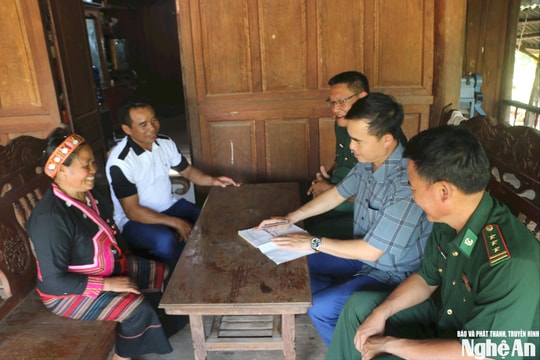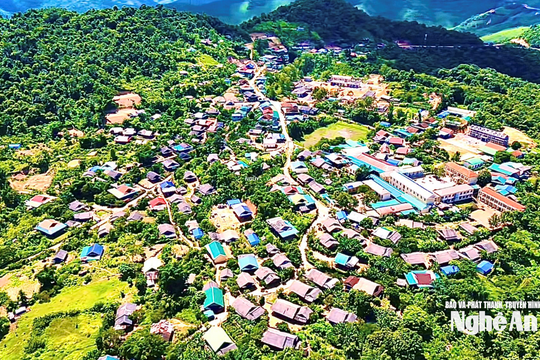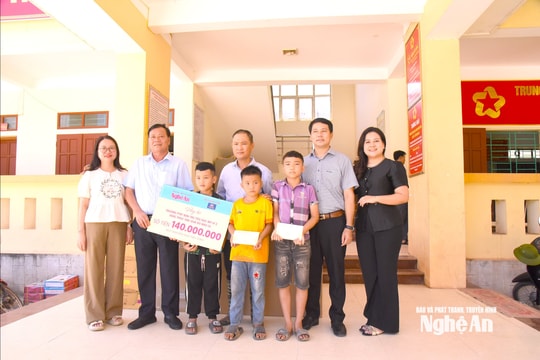The Khmu people in Keng Du and their struggle to escape poverty
(Baonghean.vn) - Keng Du Commune (Ky Son) currently has 9/10 villages of Khmu ethnic people. Tet is coming, Spring is coming, to help the people escape hunger and poverty, to have a warm Tet holiday has been a concern for many years...
Poor village on the border
Commune centerKeng DuAbout 70 km from Muong Xen town of Ky Son district, through countless slopes and a "heaven's gate" in Dooc May with mountains on one side and a deep abyss on the other. Coming to Keng Du, there are not only familiar routes with the typical scenery of the mountains and forests, the residents of Ky Son, but also stories about the people here, who, according to the elderly, seem to have not changed for many years.
From the center of Keng Du commune, we crossed 15 km of rugged, winding and steep mountain roads to reach Khe Linh village. The time near Lunar New Year is also the harvest season of the Ky Son people.
Along the way, we occasionally saw images of children, or grandmothers and mothers holding bundles of fresh bamboo shoots that they had just collected from the mountainside, leisurely walking home. Passing the checkpoint for people entering and leaving the border to prevent and fight the Covid-19 epidemic of Keng Du Border Guard Station, Khe Linh village appeared with thatched-roof stilt houses looming halfway up the mountain.
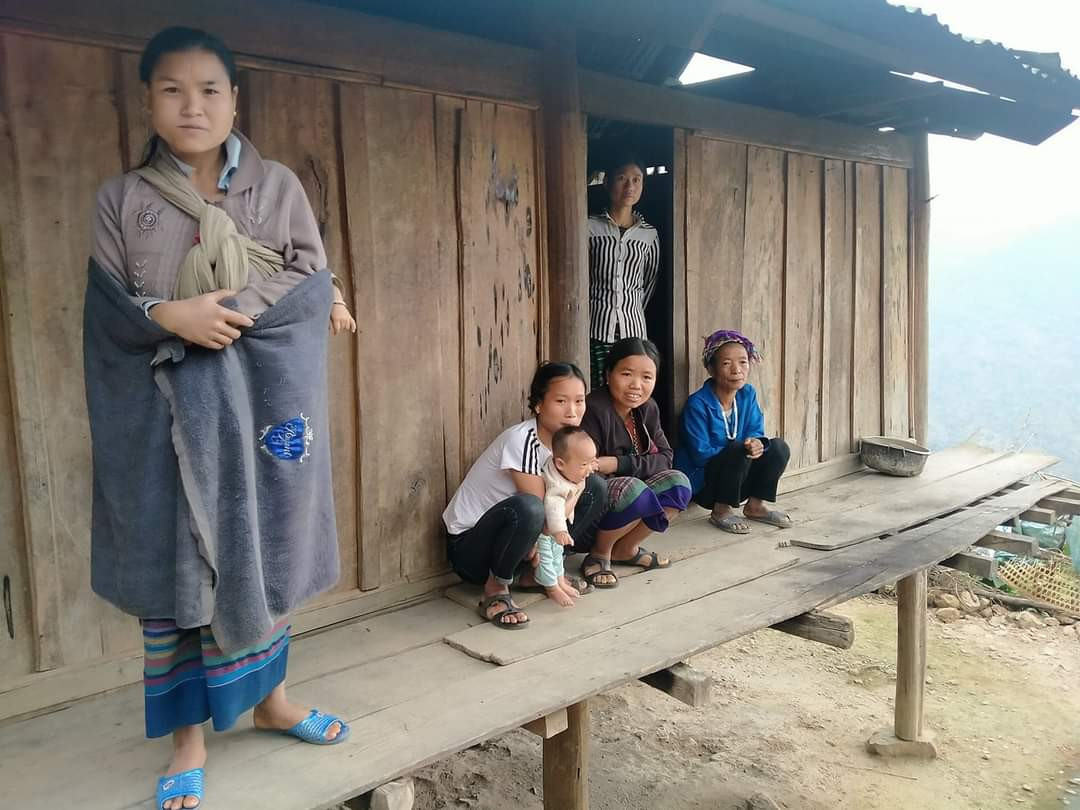 |
| Familiar image of the Khmu people in Keng Du. Photo: Hoai Thu |
The most prominent highlight of Khe Linh village is the row of solidly built level 4 houses with blue corrugated iron roofs and a towering national flagpole in front of the yard. Around, the old houses of the Khmu ethnic group are scattered, interspersed with ranges of hills covered in the color of rocks and grass that have just experienced a cold winter, and the silver color of the vast reed and reed trees./.
In Khe Linh, the arrival of strangers to the village was an “event” that made the villagers very concerned. The children curiously observed the strange “guests”, shyly hiding behind their elders, or hugging the legs of adults, looking around with eyes that were both expectant and a little scared. However, all the children’s faces were dark and dirty.
In the last days of winter, in this remote mountainous area near the border with Laos, the weather is freezing cold. Yet most of the children wear only one shirt, some wear shorts, or wrap around their mother’s or sister’s scarf… but all of them are worn out and dirty.
We often see these familiar images in the villages of Ky Son, but here they are countless. In Keng Du, the further away you go to villages like Huoi Xui, Keo Con, which are nearly 20 km from the commune center, the more common these images are. Because hunger and poverty still haunt the people here from generation to generation.
Here, each house has a narrow yard, sometimes the slope is the children's playground. There are dozens of households in Khe Linh village, but it is difficult to find rows of green vegetables outside the lush vegetable gardens of the border guards at the control post at the beginning of the village.
People depend on nature for everything from food to water for daily activities. In years with favorable weather and favorable winds, the upland rice crop is heavy with grain, so they don't have to eat corn or cassava instead of rice. In years with abundant rainfall, people have enough water for daily activities.
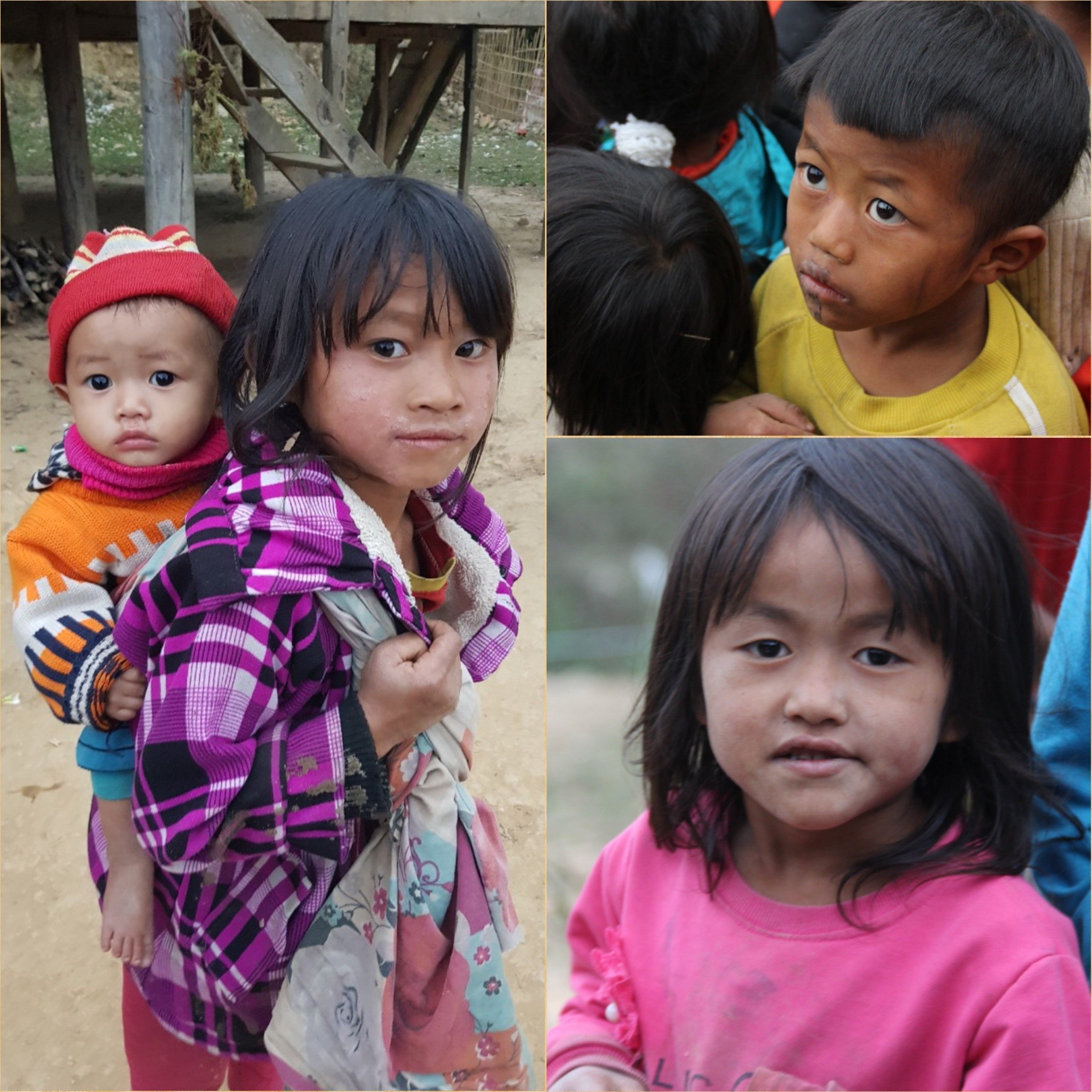 |
| Khmu children in Khe Linh village, Keng Du commune. Photo: Hoai Thu |
Khe Linh village has unfortunate fates like Mr. Cut Pho Lu, only over 60 years old but looks old and weak like an 80 year old, can't walk steadily, has to use a cane. He has 8 children, but his children are all poor, and have all moved out. His wife has passed away, now Mr. Cut Pho Lu lives alone in a dilapidated house, and lives on government subsidies, the neighbors are also poor so they rarely give him much. All year round he only eats rice with salt, occasionally has a package of instant noodles, and is given a little meat on holidays and Tet.
The overwhelming poverty makes the village desolate. Not only the elderly like Mr. Pho Lu, but also the young people, those who are still able to work like Lo Van Nhi, Xeo Pho Kham... still maintain the habit of depending on nature, gathering forest products to survive... Women and the elderly, outside of the farming season, do not know what to do other than gather to talk, sometimes sit together and contemplate the mountains and hills, making people seem to lose their will to escape poverty.
“Khe Linh has 58 households, of which 53 are poor. The number of households that know how to raise buffalo, cows, and pigs can be counted on the fingers of one hand. Mostly, people go into the forest, climb hills and mountains to work one crop a year to earn rice for the whole year. The rest just eat whatever they can find. If they don’t have anything, they eat sticky rice with white salt” - Khe Linh village chief Lo Van Son expressed.
Dirty children, old people living waiting for the day to return to the mountains and forests, strong people waiting for favorable weather, in harmony with one crop season each year, occasionally picking up some forest products such as bamboo shoots, reeds, raising a few chickens and pigs enough for holidays, all their lives hanging around the familiar house... Those peopleKhmuIn Khe Linh, Keng Du commune, it has been like this for generations. "They are attached to the mountains and forests of the border, but it is still a long way to escape poverty. They don't know what to do to get better," said Lo Van Son.
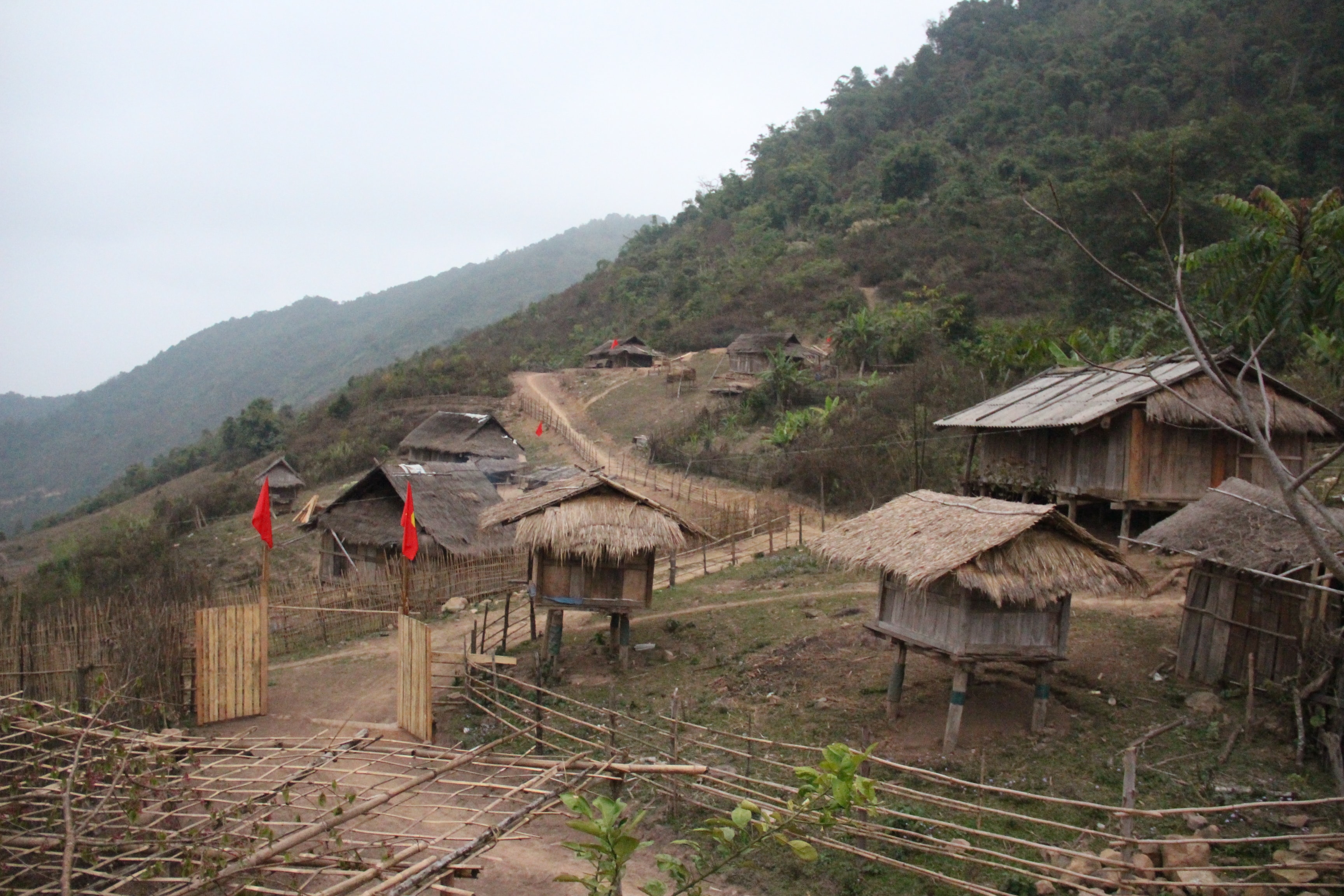 |
| A corner of Khe Linh village. Photo: Hoai Thu |
Need the will to rise
However, the Khmu people in Keng Du still have people who want to break out and change their fate and that of their children, like Mr. Moong Pho Lu in Huoi Phuon 2 village. "To escape poverty, we cannot rely entirely on the support of others. Each person must have the will to rise up and hope to change. Like Mr. Moong Pho Lu!", Mr. Luong Van Ngam - Secretary and Chairman of the People's Committee of Keng Du commune expressed. Mr. Pho Lu is over 50 years old this year, has 6 children and is considered one of the most prosperous Khmu households in Keng Du commune.
Coming to Mr. Moong Pho Lu’s farm, the scene here is very different from most of the Khmu ethnic minority villages in Keng Du. Right at the top of the slope leading to his farm are rows of mustard greens with bright yellow flower stalks. Next to it is a small fish pond with schools of fish swimming around, and accustomed to coming up to look for food whenever someone approaches.
Going through a stretch of rice fields on both sides is the pig pen area, down a few more rice fields is the cow pen area. For the Khmu ethnic group, Mr. Pho Lu's property is a dream of many people, a typical example of economic development for the people here.
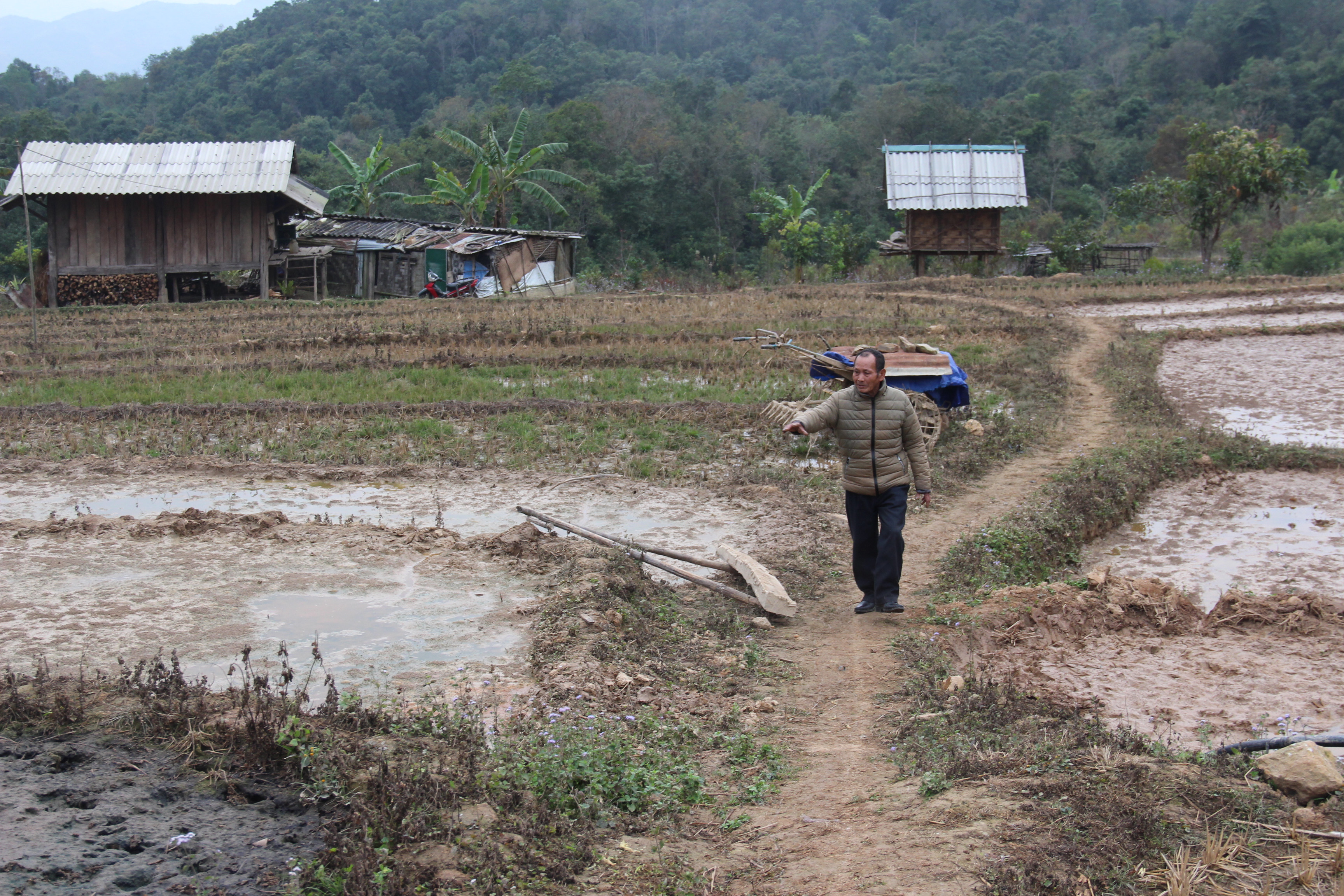 |
| Mr. Moong Pho Lu's farm area. Photo: Hoai Thu |
“My father has had this farm since 1994, and he has worked very hard to make a living. In 2021, my family will strive to escape poverty,” said old man Moong Pho Lu, from Huoi Phuon 2 village, Keng Du commune (Ky Son). After decades of struggling with what to plant and what to raise, Mr. Pho Lu’s family has overcome the “threshold” of poor households in 2020, “advancing” to near-poor households.
And as Mr. Pho Lu determined, in 2021 he will make an effort to escape from near-poverty. Mr. Pho Lu and his wife currently live with their third son and his wife. Of the 6 children, 3 are married, 2 have their own place to live, 3 are still going to school. Mr. Pho Lu himself is a war invalid with a 61% disability. After more than 10 years in the army, he returned to his hometown, got married and worked hard in production.
Mr. Pho Lu said he had started his farm in 1994, but for many years he had only been struggling with one rice crop, raising cows and pigs, but diseases were constant. “Every year there were diseases, the pigs and chickens were stunted, very difficult to raise, if lucky, there was only enough to serve the family and not to sell,” said Mr. Pho Lu.
Then he confided that everyone here did the same thing. Growing rice depended on the weather. If the year was favorable, they would have enough to eat all year round, but if there was a drought or flood, they would go hungry. Raising buffalo, cows, pigs or goats was like many other families. They wanted to raise them but didn't have the money to buy the breed, so they had to give up. In addition, the custom of wanting to have many children meant that every family was poor, with five or seven children. It was difficult to feed them, and they wore whatever they had, rarely having money to buy nice things for their children.
“It wasn’t until the border guards helped that things began to change,” said Moong Pho Lu. He then said that the soldiers came to his family, learned about it, and encouraged him and his wife to increase production. The soldiers told him that each person must try their best to escape poverty, and that any support is limited and cannot last a lifetime. As for the future generations, they cannot just wait for help.
Listening and understanding, he was determined to escape poverty. For the past two years, with the support of Keng Du Border Guard Station in terms of plants, seeds, care, disease prevention, and farming techniques, Mr. Pho Lu's farm has put on a new coat of clothes, warmer, brighter.
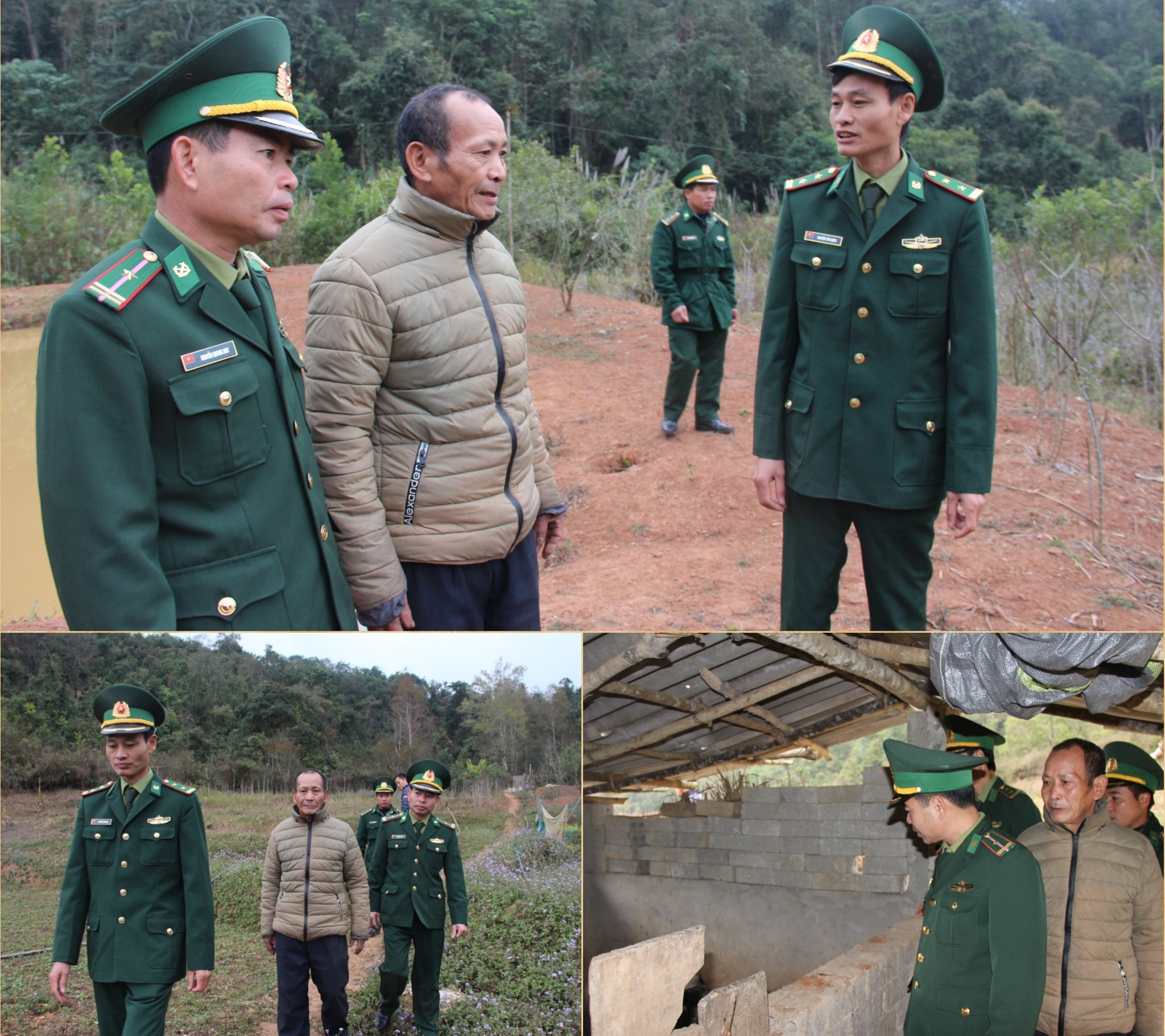 |
| Keng Du Border Guard Station officers help Mr. Moong Pho Lu's family develop their economy. Photo: Hoai Thu |
Officers and soldiers of Keng Du Border Guard Station guided his family to improve the land in the farm area by de-acidifying the soil with lime, composting cow and buffalo manure, and fertilizing with grass and herbs to make the soil loose. Then they set up terraced fields to grow rice.
The soldiers also encouraged him to keep cows and pigs in captivity, abandoning the long-standing custom of the people. Because if kept in captivity, the animals would be less susceptible to disease and fatter, and reproduce more. He trusted and listened, because in addition to advice on what to raise and what to plant, the soldiers also supported him with seeds, rolled up their sleeves to work with his family in production for many days and months, and were as close to his family as family...
Seeing the soldiers leading us to visit his farm, old Moong Pho Lu was very excited, showing off his family's property, and leading us to each barn. Just arriving at the pig barn, two sows had just given birth to a litter of piglets 2 days ago, Mr. Pho Lu happily said that this year the pigs were reproducing well, and it was expected that there would be a decent income. "My herd of cows now has 4, plus 6 cows of my third son and his wife, this year I will strive to escape poverty," Mr. Pho Lu happily said. Mr. Pho Lu's joy is also the joy of those who have worked hard to help and support his family to change their mindset, thinking and determination to rise up.escape poverty.
And now, halfway through his life, Mr. Pho Lu has just realized the power of will. He said that only by wanting to escape poverty, and with the support and encouragement of the government and border guards, can he succeed.
Keng Du has 9/10 villages where the Khmu ethnic group lives with about 600 households, of which nearly 70% are poor households. In order for the Khmu ethnic group here to change their way of thinking and working, to escape poverty and suffering, it is necessary for people like Mr. Moong Pho Lu, who know how to strive to overcome their circumstances right from their thoughts, so that there will be no more poor springs, so that Khmu people like Mr. Pho Lu are no longer "rare" in this remote border area.

